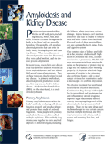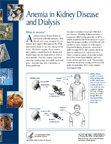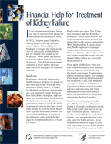Treatment Methods for Kidney Failure
Treatment Methods for Kidney Failure is a series of booklets and fact sheets developed by the National Institute of Diabetes and Digestive and Kidney Diseases (NIDDK). The NIDDK is part of the National Institutes of Health under the U.S. Department of Health and Human Services. The booklets introduce the major treatment options, and the fact sheets focus on more specific complications and treatment issues.
Booklets
 |
Kidney Failure: Choosing a Treatment That's Right for You Provides a broad overview of the treatment options for a person facing kidney failure. Introduces hemodialysis, peritoneal dialysis, and kidney transplantation with a general description of each method and a list of pros and cons. Concludes with a list of resources for more information. *Print PDF Version (832 KB) * En Español Insuficiencia renal: Cómo escoger el mejor tratamiento para usted **la versión de pdf (474 KB) * |
|
 |
Treatment Methods for Kidney Failure: Hemodialysis Details the procedures and equipment involved in hemodialysis. Explains vascular access and dietary issues. Briefly describes some of the complications of kidney failure. Lists resources for additional information. *Print PDF Version (250 KB) * En Español Métodos de tratamiento para la insuficiencia renal: Hemodiálisis **la versión de pdf (527 KB) * |
|
 |
Treatment Methods for Kidney Failure: Peritoneal Dialysis Describes the procedures and supplies required for peritoneal dialysis (PD). Explains the differences between ambulatory and automated PD. Gives instructions on how to avoid problems that can develop. *Print PDF Version (377 KB) * |
|
 |
Treatment Methods for Kidney Failure: Kidney Transplantation Gives a step-by-step account of the transplant process from the initial medical evaluation and being placed on a waiting list to surgery, recovery, and maintenance with antirejection medicines. Covers issues of organ donation and matching. *Print PDF Version (248 KB) * |
|
 |
Eat Right to Feel Right on Hemodialysis Designed to help renal dietitians work with their patients to choose the right foods. Explains how food affects hemodialysis patients and describes the roles of fluids, potassium, phosphorus, protein, sodium, calories, and vitamins and minerals. Written in easy-to-read language. *Print PDF Version (673 KB) * En Español Insuficiencia renal: Coma bien para sentirse bien durante su tratamiento de hemodiálisis **la versión de pdf (462 KB) * |
|
 |
Kidney Failure Glossary Defines medical terms and concepts used by health professionals and found throughout the Treatment Methods for Kidney Failure series. *Print PDF Version (187 KB) * |
|
[Top]
Fact Sheets
 |
Home Hemodialysis Discusses the differences between hemodialysis in a clinic and hemodialysis in the home. Explains the advantages of home hemodialysis and lists a few barriers that might prevent some people from taking hemodialysis in their homes. Describes research involving more frequent hemodialysis. *Print PDF Version (540 KB) * |
|
 |
Vascular Access for Hemodialysis Details the three types of access and the circumstances under which each is used. Designed to help patients understand and manage this essential component of hemodialysis, the fact sheet contains simple line drawings of each type of access. *Print PDF Version (189 KB) * |
|
 |
Hemodialysis Dose and Adequacy Provides a detailed explanation of the urea reduction ratio (URR) and Kt/V formulas used to determine whether you are receiving an adequate dose of hemodialysis. *Print PDF Version (308 KB) * |
|
 |
Peritoneal Dialysis Dose and Adequacy Explains the importance of performing all of your exchanges. Describes the procedures used to measure how well your treatments are working. *Print PDF Version (270 KB) * |
|
 |
Amyloidosis and Kidney Disease Describes primary amyloidosis, a disease that can lead to kidney failure, and dialysis-related amyloidosis, a disease that usually develops only after 5 or more years of kidney failure treated with dialysis. *Print PDF Version (179 KB) * |
|
 |
Anemia in Kidney Disease and Dialysis Explains the kidneys' role in making red blood cells and how kidney disease can lead to anemia, the shortage of red blood cells. Explains procedures for diagnosing anemia and lists its treatments, including EPO injections. *Print PDF Version (521 KB) * |
|
 |
Chronic Kidney Disease-Mineral and Bone Disorder (formerly Renal Osteodystrophy) Explains how working kidneys contribute to healthy bones and why kidney disease can lead to bone problems. Covers diagnosis and treatment of renal osteodystrophy, a complication that affects 90 percent of dialysis patients. *Print PDF Version (175 KB) * |
|
 |
Financial Help for Treatment of Kidney Failure Briefly describes the Federal Government's insurance program that covers much of the cost of dialysis treatments and transplantation expenses. Lists additional sources of assistance and explains the role of the nephrology social worker. *Print PDF Version (335 KB) * |
|
 |
Kidney Failure: What to Expect Describes the complications of kidney failure and its treatment for patients who have just started dialysis. Discusses symptoms of and remedies for anemia, loss of appetite, nausea, pruritis, sleep disorders, and depression. *Print PDF Version (2,031 KB) * |
|
For additional information on kidney failure, see the Centers for Medicare & Medicaid Services (CMS) page on ESRD Information Resources.
* pdf versions require the free Adobe® Acrobat® Reader  software for viewing.
software for viewing.
**Para ver archivos en formato pdf se necesita el programa gratuito, Adobe® Acrobat® Reader. 
[Top]
Page last updated November 15, 2011






